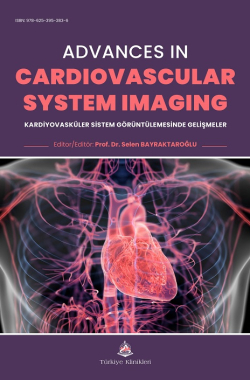Artificial Intelligence in Cardiovascular Imaging
Ali Fuat TEKİNa , Yiğit Can KARTALa
aİstanbul Başakşehir Çam ve Sakura City Hospital, Clinic of Radiology, İstanbul, Türkiye
Tekin AF, Kartal YC. Artificial intelligence in cardiovascular imaging. In: Bayraktaroğlu S, ed. Advances in Cardiovascular System Imaging. 1st ed. Ankara: Türkiye Klinikleri; 2024. p.74-8.
ABSTRACT
Artificial intelligence (AI) in cardiovascular imaging plays a significant role in the diagnosis and management of diseases. Techniques like deep learning and machine learning enhance image analysis and interpretation, improving diagnostic accuracy and efficiency. Models such as convolutional neural networks (CNNs) and generative adversarial networks (GANs) are used for image segmentation, disease detection, and treatment planning. AI is also employed to enhance image quality and accelerate diagnostic processes in cardiovascular imaging. However, challenges such as data quality, clinical integration, and ethical issues persist. Overcoming these challenges is crucial for the successful transition of AI technologies into clinical practice, ultimately improving patient care.
Keywords: Artificial intelligence; deep learning; image segmentation; diagnostic accuracy; cardiac imaging
Kaynak Göster
Referanslar
- World Health Organization [İnternet sitesi]. Cardiovascular diseases (CVDs).©2021 [Erişim Tarihi: 15.06.2024]. Erişim Linki: [Link]
- Litjens G, Kooi T, Bejnordi BE, Setio AAA, Ciompi F, Ghafoorian M, van der Laak JAWM, van Ginneken B, Sánchez CI. A survey on deep learning in medical image analysis. Med Image Anal. 2017;42:60-88. [Crossref]
- Leiner T, Varga-Szemes A, Meinel FG, Schoepf UJ, et al. Artificial intelligence in cardiovascular imaging: Opportunities and challenges. European Radiology. 2021;31(9);6401-10.
- Dey D, Slomka PJ, Leeson P, Comaniciu D, Shrestha S, Sengupta PP, Marwick TH. Artificial Intelligence in Cardiovascular Imaging: JACC State-of-the-Art Review. J Am Coll Cardiol. 2019;73(11):1317-35. [Crossref]
- Petersen SE, Abdulkareem M, Leiner T. Artificial intelligence for cardiovascular imaging: Present and future. European Heart Journal-Cardiovascular Imaging. 2022;23(1):1-3.
- Zheng Q, Delingette H, Duchateau N, Ayache N, et al. 3D deep learning for cardiovascular imaging. Frontiers in Cardiovascular Medicine. 2018;28: 638472.
- Wolterink JM, Leiner T, Viergever MA, Išgum I, et al. Generative adversarial networks for noise reduction in low-dose CT. IEEE transactions on medical imaging. 2017;36(12);2536-45. [Crossref]
- Huang K, Altosaar J, Ranganath R, et al. ClinicalBERT: Modeling Clinical Notes and Predicting Hospital Readmission. arXiv preprint arXiv: 2022; 1904.05342.
- Motwani M, Dey D, Berman DS, Germano G, Achenbach S, Al-Mallah, et al. Machine learning for prediction of all-cause mortality in patients with suspected coronary artery disease: a 5-year multicentre prospective registry analysis. European heart journal. 2017;38(7);500-7. [Crossref]
- Topol EJ, et al. High-performance medicine: the convergence of human and artificial intelligence. Nature medicine. 2019;25(1):44-56. [Crossref]
- Brandt V, Schoepf UJ, Aquino GJ, et al. Impact of machine-learning-based coronary computed tomography angiography-derived fractional flow reserve on decision-making in patients with severe aortic stenosis undergoing transcatheter aortic valve replacement. European Radiology. 2022;32:6008-16. [Crossref]
- Morales MA, Manning WJ, Nezafat R, et al. Present and Future Innovations in AI and Cardiac MRI. Radiology. 2024;310(1):e231269. [Crossref]
- Dawes TJ, de Marvao A, Shi W, Fletcher T, Watson GM, Wharton J, et al. Machine learning of three-dimensional right ventricular motion enables outcome prediction in pulmonary hypertension: a cardiac MR imaging study. Radiology. 2017;283(2):381-90. [Crossref]
- Lee S, Rim B, Jou SS, Gil HW, Jia X, Lee A, et al. Deep-learning-based coronary artery calcium detection from CT image. Sensors. 2021;21(21):7059. [Crossref]
- Jávorszky N, Homonnay B, Gerstenblith G, Bluemke D, Kiss P, Török M, et al. Deep learning-based atherosclerotic coronary plaque segmentation on coronary CT angiography. European radiology. 2022;32(10):7217-26. [Crossref]
- Paul JF, Rohnean A, Giroussens H, Pressat-Laffouilhere T, Wong T, et al. Evaluation of a deep learning model on coronary CT angiography for automatic stenosis detection. Diagnostic and Interventional Imaging. 2022;103(6):316-23. [Crossref]
- Kobayashi T, Nishii T, Umehara K, Ota J, Ohta Y, Fukuda T, et al. Deep learning-based noise reduction for coronary CT angiography: using four-dimensional noise-reduction images as the ground truth. Acta Radiologica. 2023;64(5):1831-40. [Crossref]
- Takahashi M, Kosuda R, Takaoka H, Yokota H, Mori Y, Ota J, et al. Deep learning-based coronary computed tomography analysis to predict functionally significant coronary artery stenosis. Heart and Vessels. 2023;38(11): 1318-28. [Crossref]
- Nagayama Y, Emoto T, Kato Y, Kidoh M, Oda S, Sakabe D, et al. Improving image quality with super-resolution deep-learning-based reconstruction in coronary CT angiography. European Radiology. 2023;33(12):8488-500. [Crossref]
- Suinesiaputra A, Mauger CA, Ambale-Venkatesh B, Bluemke DA, Dam Gade, J, Gilbert K, et al. Deep learning analysis of cardiac MRI in legacy datasets: multi-ethnic study of atherosclerosis. Frontiers in Cardiovascular Medicine. 2022;8:807728. [Crossref]
- Xu W, Shi J, Lin Y, Liu C, Xie W, Liu H, et al. Deep learning-based image segmentation model using an MRI-based convolutional neural network for physiological evaluation of the heart. Frontiers in Physiology. 2023;14:1148717. [Crossref]
- Alabed S, et al. Machine learning cardiac-MRI features predict mortality in newly diagnosed pulmonary arterial hypertension. Eur Heart J Digit Health. 2022. [Crossref]
- Vollbrecht TM, Hart C, Zhang S, Katemann C, Sprinkart AM, Isaak A, et al. Deep learning denoising reconstruction for improved image quality in fetal cardiac cine MRI. Frontiers in Cardiovascular Medicine. 2024;11:1323443. [Crossref]
- Oscanoa JA, Middione MJ, Alkan C, Yurt M, Loecher M, Vasanawala SS, et al. Deep learning-based reconstruction for cardiac MRI: a review. Bioengineering. 2023;10(3):334. [Crossref]
- Zhang Q, et al. Toward Replacing Late Gadolinium Enhancement With Artificial Intelligence Virtual Native Enhancement for Gadolinium-Free Cardiovascular Magnetic Resonance Tissue Characterization in Hypertrophic Cardiomyopathy. Circulation. 2021. [Crossref]

